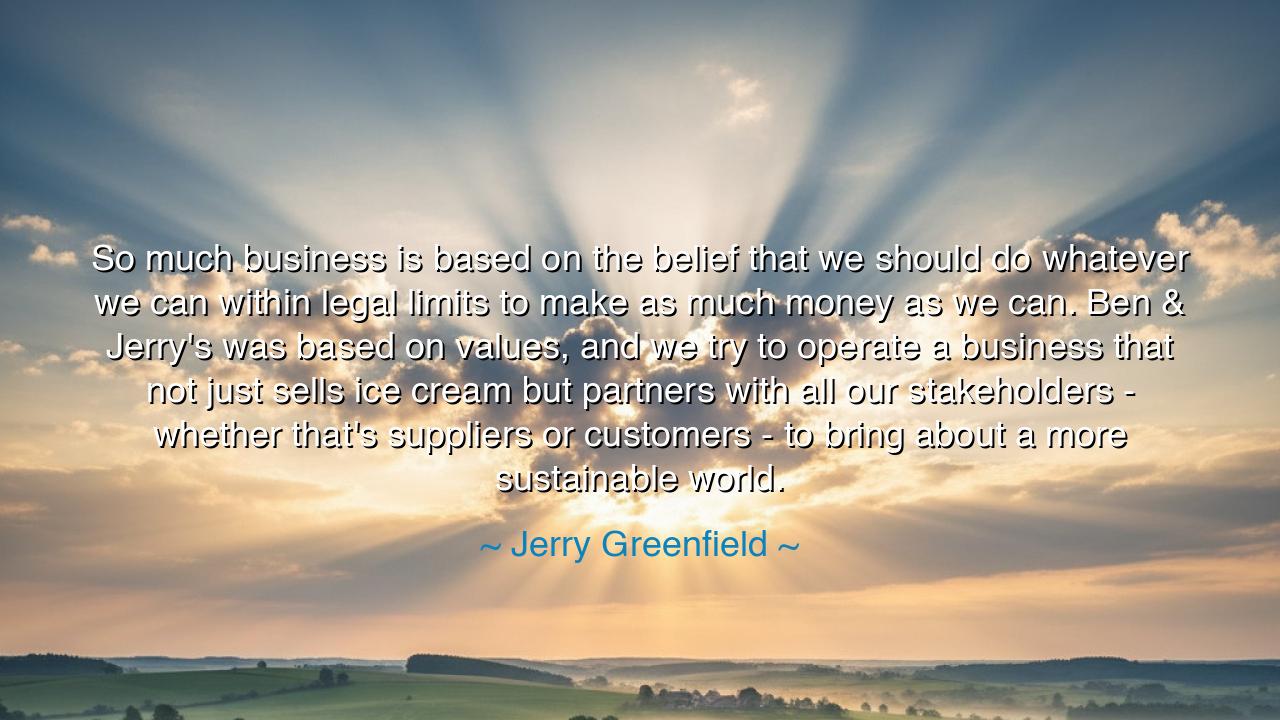
So much business is based on the belief that we should do
So much business is based on the belief that we should do whatever we can within legal limits to make as much money as we can. Ben & Jerry's was based on values, and we try to operate a business that not just sells ice cream but partners with all our stakeholders - whether that's suppliers or customers - to bring about a more sustainable world.






Hear the words of Jerry Greenfield, a merchant not only of sweetness but of wisdom: “So much business is based on the belief that we should do whatever we can within legal limits to make as much money as we can. Ben & Jerry’s was based on values, and we try to operate a business that not just sells ice cream but partners with all our stakeholders—whether that’s suppliers or customers—to bring about a more sustainable world.” In this declaration lies a vision far greater than commerce, a vision that reminds us that wealth without virtue is hollow, but wealth joined to justice becomes a blessing for all.
The meaning of this quote speaks to the heart of human ambition. In the modern age, business is often pursued as though profit were the only measure of success. So long as one stays within the legal limits, all else is deemed acceptable—be it the exploitation of workers, the depletion of the earth, or the manipulation of the poor. Greenfield challenges this creed of cold gain with a higher principle: that a company must not only take but also give, not only sell but also serve, not only profit but also protect.
History bears witness to both sides of this truth. In the age of conquest, the East India Company extracted riches from distant lands, growing fat in money while leaving famine and ruin in its wake. Its traders acted within the "limits" set by their governments, yet their deeds stained history with suffering. By contrast, in the same world, there were guilds and communities of craftsmen who held honor and fairness above profit, ensuring that their goods were just, their workers respected, their communities strengthened. Here we see the eternal divide: one path leads to empire and collapse, the other to legacy and trust.
Ben & Jerry’s, though born in humble kitchens, chose the nobler path. Its founders declared that even the making of ice cream could become an act of stewardship. By working with suppliers who farm sustainably, by listening to customers who seek fairness, by sharing their profits to uplift the poor, they proved that values can live at the heart of commerce. Their company became not merely a seller of sweetness, but a beacon, showing that business can be wedded to justice, joy, and care for the earth.
Consider also the tale of the Quakers in England, who built banks, chocolate companies, and businesses rooted in faith. They refused to cheat or exploit, and because of their reputation for honesty, people trusted them. Their enterprises flourished, not only in wealth but in moral strength. Greenfield’s words echo this ancient wisdom: that prosperity built upon values is stronger and more enduring than riches gained through selfishness alone.
The lesson is clear: do not be deceived into thinking that the measure of success is money alone. A man or woman who gains the world but loses their honor has gained nothing. So too with companies: if they earn billions but leave behind pollution, suffering, and inequality, their wealth is a curse, not a blessing. True greatness lies in building with integrity, in remembering that every stakeholder—be it farmer, worker, customer, or earth itself—must share in the fruit of success.
Practical action begins with choice. As consumers, seek out businesses that act with values, not only with profit. Support those who care for the land, who uplift their workers, who treat their suppliers fairly. As workers and leaders, demand that your labor not be used only for gain, but for good. And as citizens, call for laws that reward sustainability and punish exploitation. Every purchase, every vote, every voice can become a tool for a more sustainable world.
Thus let Jerry Greenfield’s words be remembered: that even in the realm of commerce, where greed often reigns, there can be light. A company can be more than a seller of goods; it can be a partner in justice, a steward of creation, a friend to the community. And if enough businesses follow this path, then truly the marketplace itself may become a garden—not of exploitation, but of flourishing for all.






AAdministratorAdministrator
Welcome, honored guests. Please leave a comment, we will respond soon